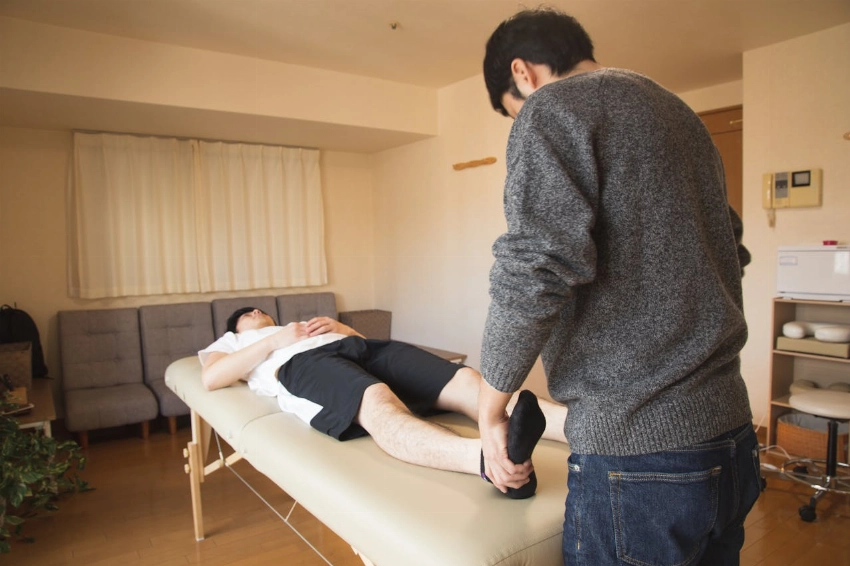Key Highlights
- What Are the Current Physiotherapy Job Opportunities in Australia? Latest Update 2025
- How Much Do Latest Physiotherapists Earn in Australia?
- What Are the Visa Requirements for Physiotherapy Jobs in Australia for Foreigners in 2025?
- How Do Current International Physiotherapists Get AHPRA Registration in 2025? Experrs Guide
- Where Can the Latest Physiotherapists Find Jobs in Australia 2025?
- What Is the Application Process for Physiotherapy Positions in 2025?
- What Specializations Are in High Demand for Physiotherapy Jobs in Australia in 2025?
- What Are the Current Working Conditions and Benefits for Physiotherapists in Australia?
- What Are the Latest Career Growth Opportunities in Australian Physiotherapy in 2025?
- Conclusion
Physiotherapy jobs in Australia are among the most fulfilling career opportunities for physiotherapists globally. With high demand, excellent pay, and several visa options, Australia welcomes physiotherapists worldwide. As an overseas physiotherapist looking to pursue a career in Australia, this book will outline everything you need to know concerning job opportunities, pay, visa requirements, and registration procedures.
What Are the Current Physiotherapy Job Opportunities in Australia? Latest Update 2025

The need for physiotherapy jobs in Australia is increasing exponentially. More than 1,000 active positions are nationwide, with openings in hospitals, private clinics, aged care, and community health programs.
Below are the most frequent workplaces for Australian physiotherapists:
-
Metropolitan Hospitals – Public and private hospitals hire physiotherapists continuously.
-
Private Practice Clinics- Specialize in musculoskeletal care, sports therapy, and rehabilitation.
-
NDIS Providers – These positions are in great demand, frequently paying AUD 100–200 per hour.
-
Regional Healthcare Centers- Organizations such as Rural Health West facilitate employment of international physiotherapists in rural regions.
-
Aged Care Facilities- As populations age, geriatric physiotherapy positions are proliferating.
Which Australian Cities Have the Highest Demand in 2025?
Some cities and states excel in physiotherapy jobs in Australia.
-
Sydney – Major healthcare centers with vast numbers of hospital positions.
-
Melbourne – Produces dozens of fresh physiotherapy positions monthly, with average salaries ranging from AUD 100,000.
-
Brisbane – Famous for its growing private practice network.
-
Darwin and Alice Springs – Provide top salaries and other relocation benefits.
-
Western Australia – Placements in rural settings tend to involve better pay and allowances.
How Much Do Latest Physiotherapists Earn in Australia?
What are the physiotherapy jobs in Australia salary? One of the main attractions of physiotherapy jobs in Australia is the competitive salary structure. Earnings vary depending on experience, location, and specialization.
Here's a clear physiotherapy jobs in Australia salary breakdown:
-
Entry-Level (0–2 Years) – $67,000–$80,000 – $34–$44/hour
-
Mid-Level (4–8 Years) – $80,000–$95,000 – $40–$50/hour
-
Senior (8+ Years) – $95,000–$110,000 – $48–$60+/hour
-
Specialist Roles – $110,000–$138,000 – flexible higher rates
|
Experience Level |
Annual Salary (AUD) |
Hourly Rate (AUD) |
|
Entry-level (0-2 years) |
$67,000 - $80,000 |
$34 - $44 |
|
Mid-level (4-8 years) |
$80,000 - $95,000 |
$40 - $50 |
|
Senior (8+ years) |
$95,000 - $110,000 |
$48 - $60+ |
|
Specialist roles |
$110,000 - $138,000 |
Highly flexible |
Also Read: Immigration To Australia: Everything You Need To Know
Current Regional Salary Variations Across Australian States
Physiotherapy jobs in Australia salary levels also vary depending on where you work.
-
Sydney and Perth – $75,000–$110,000 annually
-
Melbourne and Brisbane – $80,000–$105,000 annually
-
Tasmania and Northern Territory – $65,000–$90,000 plus incentives
-
Rural Areas – Often higher packages to attract foreign workers
What Are the Visa Requirements for Physiotherapy Jobs in Australia for Foreigners in 2025?

Physiotherapy jobs in Australia for foreigners require applicants to apply for an appropriate visa before employment in Australia. The visa will depend on your qualifications, experience, and whether you have an employer willing to sponsor you.
The following are the most frequent visa routes for Physiotherapy jobs in Australia for foreigners:
1. Skills in Demand Visa (Subclass 482)
-
Needs employer sponsorship by a registered Australian firm or healthcare provider.
-
The minimum salary requirement of AUD 73,150 needs to be fulfilled.
-
Offers a temporary work visa, typically valid for up to 4 years.
-
It can serve as a stepping stone to permanent residency through employer nomination.
2. Skilled Independent Visa (Subclass 189)
-
An employer-free points-based visa.
-
Applicants are evaluated on age, qualifications, English proficiency, and work experience.
-
Does not provide permanent residency but offers long-term residency with full work rights.
-
It offers greater flexibility for any employer in Australia.
3. Employer Nomination Scheme (Subclass 186)
-
A straightforward route to permanent residence in Australia.
-
You need sponsorship from a recognized employer that nominates you for the position.
-
Ideal for qualified physiotherapists with ongoing employment offers.
-
Provides permanent employment rights and entitlement to family sponsorship.
Latest Regional Visa Opportunities and Benefits
Australia also provides special visa options for those willing to work outside the big cities.
-
Skilled Work Regional Visa (Subclass 494) offers provisional residency for 5 years.
-
Excludes Sydney, Melbourne, and Brisbane.
-
The pathway to permanent residency is available after 3 years.
How Do Current International Physiotherapists Get AHPRA Registration in 2025? Experrs Guide
All physiotherapy jobs in Australia need AHPRA registration. This confirms that you are up to local professional standards and legally qualified to practice as a physiotherapist.
The registration process consists of various essential steps:
Also Read: Temporary Skill Shortage Visa Australia (TSS): Updated
1. Australian Physiotherapy Council (APC) Assessment
-
Your qualifications are compared with Australian standards of physiotherapy practice.
-
A written test can be necessary based on your country of training.
-
Some candidates must also undertake a clinical assessment to show proficiency in practice.
2. Documentation Requirements
-
Identification, e.g., passport or national ID.
-
Degree certificate and transcript of your physiotherapy course.
-
Evidence of English language ability, usually an IELTS or OET result.
-
Criminal record check or police clearance certificate.
-
Verification of work experience, if relevant
3. AHPRA Final Registration
-
Submit the APC Final Certificate of successful assessment.
-
Payment of registration fees for practising physiotherapists.
-
Secure professional indemnity insurance, which is compulsory in Australia.
-
After completion, you are granted general registration to work lawfully as a physiotherapist in Australia.
The entire process can take 6 months or more than a year, depending upon your qualifications, exam requirements, and documentation preparedness.
Assessment Pathways and Timelines in 2025
Depending on your country of training, the process may take:
-
6 months if qualifications are already recognized
-
12 months or more if exams and clinical assessments are required
Where Can the Latest Physiotherapists Find Jobs in Australia 2025?
Finding physiotherapy jobs in Australia is simpler if you know where to look. Utilizing specialist portals and recruitment networks, such as visa-sponsored roles, enhances the chances of discovering favorable vacancies.
Some of the Top Sites to Look for Jobs
-
jobs4physios – Specialist portal for physio vacancies hosted by the Australian Physiotherapy Association.
-
Healthcare Australia – A Specialized allied health recruitment agency with hospital and private practice vacancies.
-
Intelligent Health Care Australia – Offers regional placement for physiotherapists to work away from main cities.
General Job Boards
-
LinkedIn – Over 1,000 active physiotherapy positions advertised, including those with visa sponsorship.
-
SEEK Australia – Complete platform for public and private healthcare jobs nationwide.
-
Indeed- Australia offers numerous positions with employer sponsorship, which is the best for overseas physiotherapists.
Regional Recruitment Programs
-
Rural Health West – Specialized in filling physiotherapist positions in Western Australia's country areas, usually with more benefits.
-
State Health Department Job Boards – Advertises positions in public hospitals and community health centers.
-
Private Hospital Networks- Provides specialized clinical positions and potential sponsorship for foreign-trained physiotherapists.
Keeping your searches simultaneous across specialized, general, and regional boards increases your likelihood of getting physiotherapy jobs in Australia fast.
Also Read: Skilled Independent Visa Australia 189
Current Employer Sponsorship Opportunities
Many healthcare providers directly sponsor international physiotherapists. Companies like Intelligent Health Care Australia regularly recruit professionals with complete benefits packages.
What Is the Application Process for Physiotherapy Positions in 2025?

Preparing for physiotherapy jobs in Australia involves meticulous preparation and planning. Adhering to the conventional Australian recruitment method enhances your prospects.
The conventional application process involves the following steps:
1. Draft an Australian-Style CV
-
Emphasize your physiotherapy education, clinical experience, and appropriate skills.
-
Make it concise, ideally 2-3 pages.
-
Organize clear headings and use bullet points for easy reading.
2. Draft a Custom Cover Letter
-
Specifically address the employer and job.
-
Highlight your relevant experience in relation to Australian healthcare standards.
-
Refer to your willingness to move or work in rural locations where appropriate.
3. Send Job Applications
-
Utilize specialized physiotherapy websites, general job boards, or recruitment firms.
-
Monitor job applications to follow up professionally.
4. Go to Interviews
-
It may be online or face-to-face, depending on the employer.
-
Prepare for clinical situation questions and behavioral interviews.
-
Highlight your knowledge of Australian physiotherapy practice standards.
5. Be Offered and Negotiate
-
Discuss the contract terms, such as salary, working hours, and benefits.
-
Clarify visa sponsorship arrangements if provided by the employer.
6. Obtain a Visa Sponsorship or a Skilled Visa
-
Employer-sponsored positions typically have Subclass 482 or 186 visas.
-
Alternatively, seek employment through points-based visas such as Subclass 189.
Preparing your documents in an Australian format and showing familiarity with Australian healthcare practices greatly improves your chances of securing physiotherapy jobs in Australia.
Latest Australian CV and Cover Letter Standards
Your application must meet Australian norms.
-
CV should be 2–3 pages maximum.
-
Include professional achievements, not just duties.
-
Add references from supervisors or colleagues
-
Cover letter should be personalized and concise
Current Interview Process and Expectations
Australian employers assess more than just skills.
-
Expect questions about clinical scenarios.
-
Be prepared for case studies or role plays
-
Showcase cultural adaptability and teamwork skills
What Specializations Are in High Demand for Physiotherapy Jobs in Australia in 2025?
Physiotherapy jobs in Australia are not just in general practice. Specialization is highly sought after and tends to be highly paid, with opportunities for career progression.
The following are the most popular physiotherapy jobs in Australia, specializations:
1. Musculoskeletal Physiotherapy
-
Specializes in sports injuries, workplace recovery, and joint/muscle conditions.
-
Provides the highest number of employment opportunities throughout Australia.
-
Average salary bracket: AUD 80,000–120,000 per year.
-
Available in private clinics, sports centers, and hospitals.
2. Neurological Physiotherapy
-
Specialises in stroke, brain injury, spinal cord injury, and neurological disorder rehabilitation.
-
Increased demand in aged care facilities, rehabilitation hospitals, and community health programs.
-
Provides high-level compensation for senior practitioners.
-
Jobs are part of multidisciplinary teams.
3. Cardiothoracic Physiotherapy
-
Concentrates on post-operative rehabilitation, cardiac rehabilitation, and lung conditions.
-
Hospital-based jobs predominantly, including public and private hospitals.
-
Increased salary bands due to specialist skills and clinical knowledge.
-
These opportunities are available in cardiology, intensive care, and rehabilitation units.
International physiotherapists specializing in these fields hold the upper hand when searching for physiotherapy employment in Australia, especially in major city hospitals and specialized centers.
Latest NDIS and Disability Services Opportunities
Australia's National Disability Insurance Scheme (NDIS) has created a surge in demand.
-
Physiotherapists can earn AUD 100–200 per hour.
-
High need for disability and pediatric services
-
Regional NDIS placements often include relocation benefits
What Are the Current Working Conditions and Benefits for Physiotherapists in Australia?
Employers who provide physiotherapy jobs in Australia offer excellent working arrangements to encourage and keep global professionals. Incentives usually include compensation, facilitating career development, work-life balance, and general well-being.
Also Read: Top 10 Best Regional Areas In Australia For PR
-
Professional Development
-
Training funding, workshops, and professional conference sponsorship.
-
Continuing education allowance to keep up with AHPRA registration.
-
Advanced certification and specialization courses support.
-
Work-Life Balance
-
Flexible working hours and shift arrangements to accommodate individual requirements.
-
Full health and well-being programs.
-
Paid public holidays and annual leave to facilitate rest and recuperation.
-
Further Compensation
-
Reimbursement for relocation for foreign physiotherapists relocating to Australia.
-
Company cars for regional visits or community-based positions.
-
Technology allowances like laptops and mobile phones are for productive work.
Selecting jobs with extensive benefits packages can enhance job satisfaction, and working in Australia as a foreign physiotherapist.
Regional Practice Advantages in 2025
Working in regional areas provides:
-
Higher pay packages
-
Incentives for relocation
-
Lifestyle benefits like outdoor activities and close-knit communities
What Are the Latest Career Growth Opportunities in Australian Physiotherapy in 2025?

Physiotherapy jobs in Australia provide transparent and organized career development, and the profession is appealing to foreign experts who look for long-term career advancement.
Typical career streams are:
1. Specialization in Higher Proficiency Fields
-
Concentration on high-salary specializations like sports physiotherapy, neurological rehabilitation, or cardiothoracic physiotherapy.
-
Higher-level certifications and post-graduate degrees can boost salaries and leadership positions in clinical teams.
2. Management Positions in Healthcare Organizations
-
Move into clinic manager, department head, or rehabilitation coordinator roles.
-
Involves managing staff, budgets, and clinical service provision.
3. Beginning a Private Physiotherapy Practice
-
Potential to open your own clinic in the city or regional locations.
-
Requires business registration, insurance, and compliance with local healthcare legislation.
-
Provides potential for increased earnings and adaptable work patterns.
4. Research and Academic Jobs
-
Conduct physiotherapy research, clinical trials, or teaching at universities and training schools.
-
Contribute to developing healthcare knowledge and practices while mentoring future generations of physiotherapists.
Strategic career planning by international physiotherapists can blend clinical practice, specialization, and leadership roles for sustainable growth in Australian physiotherapy careers.
Current Specialization and Advanced Certifications
With post-graduate training, physiotherapists can:
-
Increase their earning potential
-
Access senior positions in hospitals
-
Gain recognition in specialized clinics
Private Practice and Business Ownership in 2025
Many physiotherapists in Australia eventually open private practices.
-
Requires business registration and insurance
-
Startup costs can range from AUD 30,000 to 50,000
-
Potential to earn well above AUD 150,000 annually
Conclusion
Physiotherapy jobs in Australia offer overseas professionals a great chance to develop a fulfilling career. With average salaries ranging between AUD 88,000 and 95,000, several visa channels, and increasing demand in major cities and regional towns, Australia stands out as one of the best places for physiotherapists globally. You can effectively begin your professional journey in Australia by obtaining AHPRA registration, finding a job offer, and selecting the appropriate visa. For global physiotherapists seeking stability, expansion, and international recognition, physiotherapist careers in Australia continue to be among the most appealing career choices in 2025.
Contact TerraTern for more information on physiotherapy jobs in Australia.






